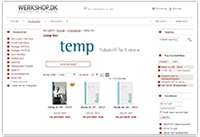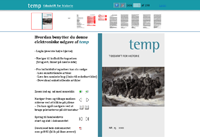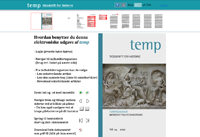ABSTRACT [DK]
Nils Arne Sørensen
Samtid for historikere
Den måske mest markante, men i historiografiske analyser noget oversete, udvikling i historievidenskaben de sidste 75 år, er, hvordan studiet af samtidshistorie har udviklet sig til faget kvantitativt dominerende felt. På basis af en læsning af en række tekster, hvor samtidshistorikere siden 1950’erne har argumenteret for samtidshistoriens vigtighed og særtræk, påvises det, hvordan begrebet bruges i tre erkendelsesmæssigt forskellige betydninger (som analyser af tiden siden et bestemt tidspunkt, som analyser af ”de medlevendes epoke” og som analyser af nutidiges problemfelters historie). Trods disse forskellige positioner har samtidshistorien imidlertid i praksis været præget af en inerti, som betyder, at samtidshistorien er kommet til at dække en stadig længere kronologi. Denne praksis udfordres af forståelsen af den nyeste tid som værende præget af stadig stigende forandringstempo, og artiklen diskuterer afslutningsvis, hvordan dette stiller krav til en skarpere profilering af det samtidshistoriske felts særtræk.
ABSTRACT [UK]
Nils Arne Sørensen
Contemporary – According to Historians
Although often overlooked in historiographical analyses maybe the most striking development in history as an academic discipline over the last 75 years has been how the study of contemporary history has developed into being the clearly dominant field of the discipline in chronological terms. Based on a reading of key texts where practitioners of contemporary history have argued for the importance and special characteristics of contemporary history, the article demonstrates how the concept is used with three different epistemological meanings – as analyses of the period since a specific caesura, as analysis of “the era of the now living”, and as analyses of the history of current problems and issues. At the same time, the concept of contemporary history has been characterized by a striking inertia that has resulted in the “contemporary” reaching further and further back from the present. This practice is challenged by the widespread consensus that recent decades have witnesses accelerating processes of change, and the article discusses how this trend demands new reflections on how to define contemporary history and its research agendas.



